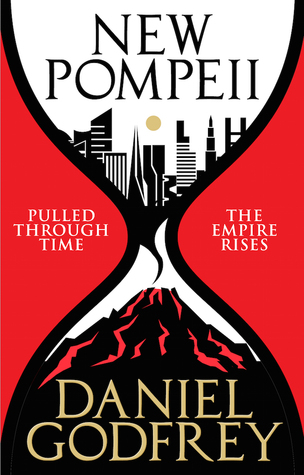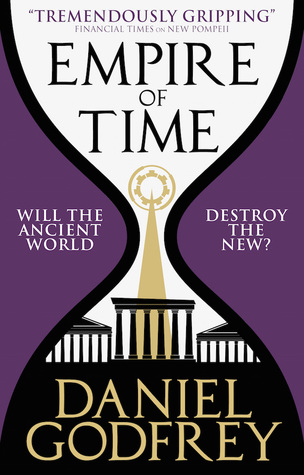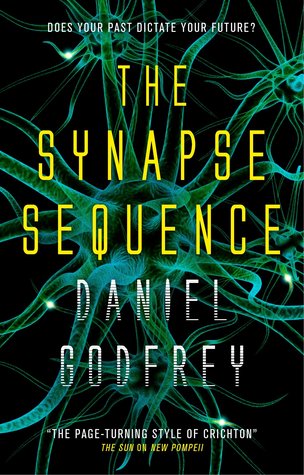Author Spotlight – Daniel Godfrey
Joining us for today’s Author Spotlight is Daniel Godfrey!
Daniel Godfrey’s first novel, New Pompeii, was shortlisted for Best Newcomer at the 2017 British Fantasy Awards, and was included in both the Financial Times’ and Morning Star’s ‘Books of 2016’ lists. It was followed by a sequel, Empire of Time. His near-future crime novel, The Synapse Sequence, was included in The Guardian’s June 2018 science fiction round-up of the best new science fiction releases.
Daniel has also self-published a children’s e-book (Johnny Max and the Panther’s Skull). He lives in Derbyshire.
Thanks for joining us today, Daniel. Let’s start small: tell us about a great book you’ve read recently!
For the first six months of 2018, I spent a lot of time dipping in and out of New Fears, a short story collection edited by Mark Morris. I particularly liked The Boggle Hole, by Alison Littlewood (probably because I grew up on the Yorkshire coast), and was unsurprised to see a couple of others shortlisted for the British Fantasy Awards. I’m not really a writer of short stories myself – I’ve done one in the last ten years – but I really enjoy reading them. The also seem to fit the SFF / Horror genre really well, and they’re perfect for when you’ve finished a novel, and aren’t quite ready to dive into the next 100k+ book.
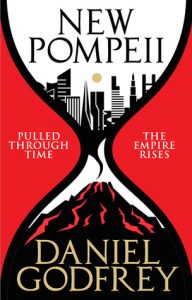 Okay, time to escalate things: reality warps and you suddenly find yourself leading a D&D-style party through a monster-infested dungeon. What character class are you, and what’s your weapon of choice?
Okay, time to escalate things: reality warps and you suddenly find yourself leading a D&D-style party through a monster-infested dungeon. What character class are you, and what’s your weapon of choice?
A wizard! But mainly because that was my favourite character when playing another game, Hero Quest, when I wasn’t acting as game master (Does anyone remember the adventure design kit? Or The Return of the Witchlord expansion pack??). The number of character classes on the side of good was limited (barbarian, wizard, elf, dwarf), but this meant new players could get into it quickly. My nephew was trying to explain Pokémon cards to me recently… I got confused within a few seconds!
When you’re not trawling through dungeons, do you prefer to type or to hand-write? Why?
Oh, I definitely type into a laptop. My novels tend to be constructed across a few different word files, and I also have a ‘scrap’ document (into which I drop anything I edit out, just in case it can be used elsewhere) and the novel outline open (so I can refer to it / improve it as I’m going along). The ability to chop things around and edit as you go with a computer means I can’t really see me ever writing anything by hand. Plus, my handwriting is so bad I tend not to be able to understand it after a few days anyway. J
And how do you like to work – in silence, with music, or serenaded by the damned souls of a thousand dead shrimps?
I really can’t work with song lyrics, or any sort of verbal background noise. I used to write to film scores (Crouching Tiger, Hidden Dragon, Gladiator, and Star Wars being favourites) – but now it tends to be silence, although I do tend to have 24hr news or sports news scrolling on my TV in the background. I keep the internet on though: I’m good at keeping away from Twitter / Facebook when I’m working, but can then easily Google things as they crop up.
Are you an architect or a gardener? A plotter or a pantser? D’you write in your underwear, or in a deep-sea diver’s suit? Tell us something unusual about your writing method!
I am somewhere between the extremes. Once I have a rough idea of the structure I want to use, I start a separate word file for each main block. I know what I want to happen at the mid-point and end of the novel as a whole, and what needs to happen in each block to get me to each point. After that, things tend to be fluid. There’s quite a lot of finger-crossing at the end when I’m threading the blocks together so that everything meshes – but the advantage is that it’s much easier to assess the pace and direction of individual story threads when they’re separated out.
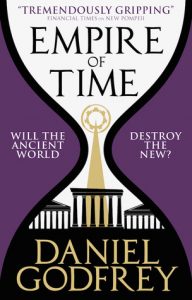
The Synapse Sequence was the first thing I’ve written with a detailed outline agreed prior to me starting work. (But even then, I went a little off-piste – as a good idea came to me whilst writing it).
I don’t actually believe there is a right way to do this stuff: an outline be very helpful, but can also be a constraint. And pantsing your way through it might mean a lot of re-writing, but that doesn’t matter if you get to your destination.
What are your most significant non-book fantasy influences?
Definitely the blockbuster popcorn films of the 1980s. Empire Strikes Back, Ghostbusters, Back to the Future, Indiana Jones.
What was the last thing you watched on TV and why did you choose to watch it?
I’m more of a movies person to be honest, as I’m fairly rubbish at watching TV. I think I’ve seen a few episodes of Breaking Bad, Sopranos, Westworld, Game of Thrones, and multiple things on the BBC…and enjoyed them all but not continued to see the full runs. I think the last thing I watched where I *had* to watch the entire thing was Battlestar Gallactica. That’s the only recent show where I’ve absolutely needed to watch back to back episodes in a single evening…
The world shifts, and you find yourself with an extra day on your hands during which you’re not allowed to write or otherwise do any work. How do you choose to spend the day?
Probably bumbling around a National Trust or English Heritage property. I’m fortunate to live in a part of the country which has multiple sites close by – from spectacular country estates to long forgotten castles.
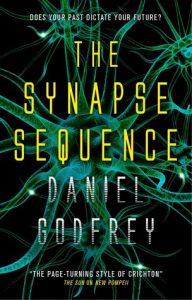 If you could choose one punctuation mark to be made illegal, which would it be and why?
If you could choose one punctuation mark to be made illegal, which would it be and why?
The double !! is a particular irritant. Banish it!!!!
What’s the most (and/or least) helpful piece of writing advice you’ve ever received?
“Most scenes (in a first draft novel) are vastly improved by deleting the final two paragraphs.” The thing about writing advice is that it often gets repeated as a ‘law’ (hailed or mocked, depending on the prevailing view) when the original intention was just to illuminate a particular issue. This piece of advice doesn’t always hold – you may have written a killer final line – but I quite often find I’ve continued a scene for too long and, simply by hacking off the split ends, it creates a better feel.
“Treat every scene like a short story.” I don’t agree with this: the two things are completely different, and can make a novel feel continually overwrought.
If you could visit any location at any point in history, where/when would you go, and why?
Given the subject of my first novel, you will no doubt be shocked to learn I would visit Pompeii! 😉
BUT, I wouldn’t visit it immediately prior to the famous eruption. The town had been hit by an earthquake in 62AD, and the town was still re-building when it was finally inundated. So, I’d probably visit it twenty or so years before Vesuvius buried it to get a view on how it was at its best…and then maybe take a day trip to Rome.
Every writer encounters stumbling blocks, be it a difficult chapter, challenging subject matter or just starting a new project. How do you motivate yourself on days when you don’t want to write?
I have two main ways of dealing with this. Firstly, all of my books start with a quote that, for me, sums up what the novel is about. I make it a habit to read the quote regularly as I’m writing to help me stay ‘on track’. The second helpful thing comes directly out of the way I construct my novels: by having multiple threads on the go at any one time it means that if any one is causing me particular bother, I can switch to another part of the narrative. Or just skip a few difficult scenes and know roughly what needs to go in the gap when it’s had longer to simmer.
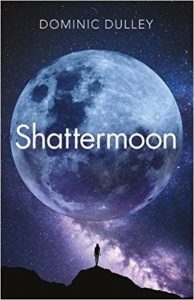 Tell us about a book that’s excellent, but underappreciated or obscure.
Tell us about a book that’s excellent, but underappreciated or obscure.
Hmm. Difficult question to answer this… as you can often think a book isn’t being talked about when it has thousands of fans! However, in terms of fantasy, I think I’ll go with Duskfall by Christopher Husberg. I don’t see it mentioned very often on forums – even though it was shortlisted for the Morningstar Award, and Brandon Sanderson gave the sequel a five star review on Goodreads.
One of the best SF books I read this year was Shattermoon by Dominic Dulley – a sort of mix of Firefly and Hustle. It’s fun, exciting read!
Both of them sound great!
Finally, would you be so kind as to dazzle us with what we like to call a ‘shark elevator pitch’? (It’s exactly the same as an elevator pitch, but with sharks.) (Well, one shark. Which, by the way, is currently picking between its rows of teeth to try and dislodge the remains of the last author who stepped onto its elevator.)
Ahem. So: why should readers check out your work? A shark elevator pitch of your own book(s) in no more than three sentences – go!
New Pompeii: Romans are scooped up and transported into the present by a nefarious company, and they’re not happy about it! (With added time travel shenanigans). Or, as my agent more succinctly put it, Jurassic Park meets Gladiator.
The Synapse Sequence: Anna Glover is the most hated woman in a future London which is dominated by AIs and bots. Now she hides from the public eye, investigating neglected criminal cases by using mind-invading technology to enter witness’s memories. When a girl goes missing, the only person who knows what happened is a boy in a coma – who is put at risk every time Anna chooses to use the Synapse Sequence to find out what happened.
Brilliant. Thanks again for joining us today, Daniel!
Daniel Godfrey is the author of New Pompeii, Empire of Time, and The Synapse Sequence, available now from Titan Books.

